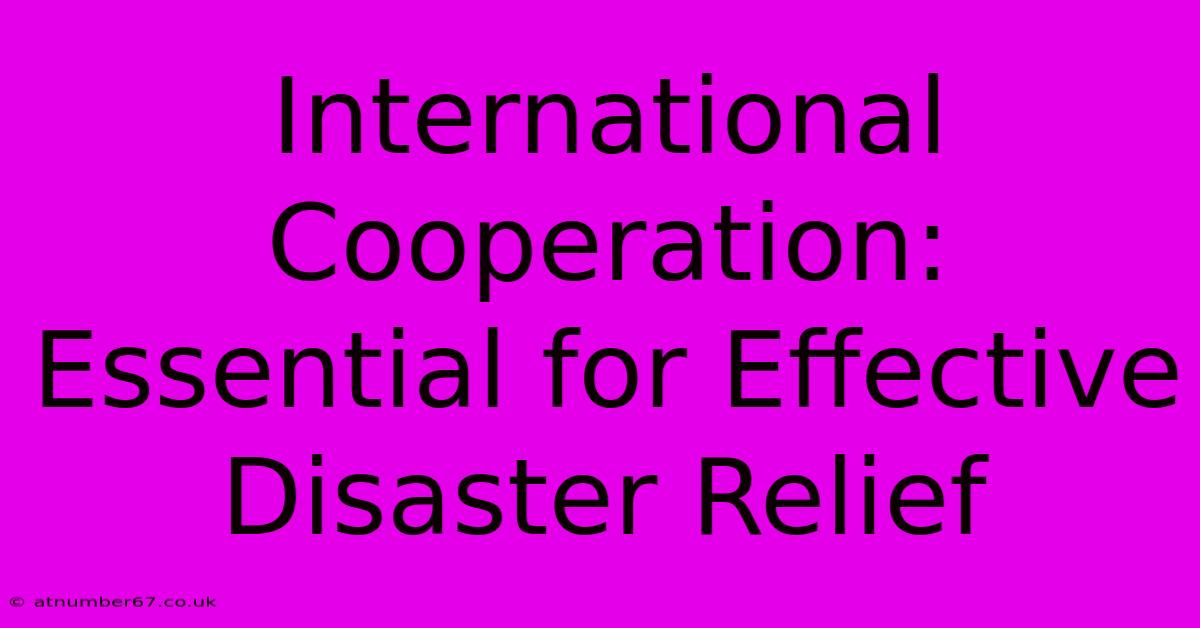International Cooperation: Essential For Effective Disaster Relief

Table of Contents
International Cooperation: Essential for Effective Disaster Relief
Natural disasters strike without warning, leaving devastation and suffering in their wake. From earthquakes and hurricanes to floods and wildfires, these events transcend national borders, demanding a coordinated and collaborative global response. International cooperation is not merely beneficial in disaster relief; it's absolutely essential for effective and efficient aid delivery. This article will explore why international collaboration is crucial for mitigating the impact of disasters and building more resilient communities worldwide.
The Scale of the Challenge: Why We Need Global Collaboration
The sheer scale of many disasters often overwhelms the resources and capabilities of even the most developed nations. Consider the 2004 Indian Ocean tsunami, which impacted numerous countries across South Asia and East Africa. The magnitude of the destruction required an immediate and massive international response, far beyond the capacity of any single nation. This highlights a critical truth: effective disaster relief necessitates a pooling of resources, expertise, and manpower on a global scale.
Insufficient National Resources:
Many countries, particularly those in developing regions, lack the infrastructure, equipment, and trained personnel needed to effectively respond to major disasters. A sudden influx of displaced people, damaged infrastructure, and widespread destruction overwhelms their capacity to manage the crisis independently. International assistance becomes critical for providing essential supplies, medical care, and logistical support.
Specialized Expertise and Technology:
Disaster relief requires specialized expertise in areas such as search and rescue, medical triage, and logistical management. Developed nations often possess sophisticated technologies and skilled personnel unavailable in disaster-stricken areas. International cooperation facilitates the rapid deployment of these resources, significantly enhancing rescue efforts and improving the chances of survival for those affected.
Key Aspects of International Cooperation in Disaster Relief:
Successful international disaster relief hinges on several crucial components:
1. Rapid Information Sharing:
Timely and accurate information is paramount. International collaboration ensures the rapid exchange of critical data, including real-time assessments of damage, the needs of affected populations, and the availability of resources. This coordinated information flow allows for a more targeted and efficient response.
2. Coordinated Resource Mobilization:
Effective disaster relief requires the coordinated mobilization of resources from multiple sources, including governments, international organizations, NGOs, and private sector actors. International cooperation establishes mechanisms for efficiently channeling donations, supplies, and personnel to where they are most needed, preventing duplication of efforts and ensuring equitable distribution.
3. Standardized Protocols and Training:
Standardized protocols and training programs for emergency responders are vital for effective collaboration. International cooperation helps establish common operating procedures, ensuring seamless integration of teams from different countries and organizations. This common understanding speeds up the relief process and minimizes confusion in chaotic environments.
4. Post-Disaster Reconstruction and Development:
Disaster relief is not just about immediate aid; it's also about long-term recovery and building resilience. International cooperation plays a key role in supporting post-disaster reconstruction, promoting sustainable development, and helping communities rebuild stronger and more resilient infrastructure.
Strengthening International Cooperation: Future Strategies
While progress has been made in international disaster relief, there's always room for improvement. Several strategies can enhance future responses:
- Strengthening international agreements and frameworks: Formal agreements can streamline the process of providing aid and coordinating responses.
- Investing in early warning systems: Improved early warning systems can give communities more time to prepare and mitigate the impact of disasters.
- Promoting capacity building in developing nations: Helping developing nations build their own disaster preparedness and response capabilities is essential for long-term sustainability.
- Fostering public-private partnerships: Collaborating with the private sector can leverage additional resources and expertise.
International cooperation is not a luxury; it's a necessity. The devastating impacts of natural disasters highlight the urgency and importance of global collaboration. By strengthening existing mechanisms and embracing innovative approaches, we can significantly improve our ability to respond to these crises and build a more resilient world for all.

Thank you for visiting our website wich cover about International Cooperation: Essential For Effective Disaster Relief. We hope the information provided has been useful to you. Feel free to contact us if you have any questions or need further assistance. See you next time and dont miss to bookmark.
Featured Posts
-
Maxx Morandos Age Putting The Rumors To Rest
Apr 12, 2025
-
Iu Age Redefining Beauty Standards
Apr 12, 2025
-
Paul Mersons Son Leaving The Legacy Behind
Apr 12, 2025
-
Tom Moores Daughter A Celebration Of Family
Apr 12, 2025
-
The Pharaohs Daughters Great Escape
Apr 12, 2025
